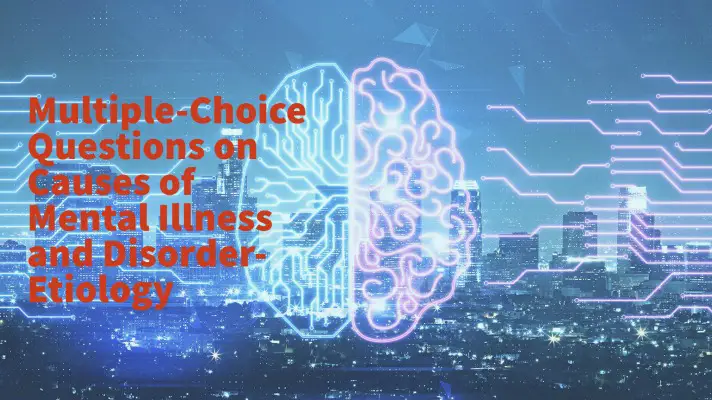Hello dear readers! In this article, I am going to display some Multiple-Choice Questions on the Causes of Mental Illness and Disorder along with the short questions. Here in this regard, please remember being a student or teacher of the Psychological department, it is our duty to make other people understand that nobody should hide the mental illness.
We, the human beings consist of mainly two elements- Mind and Body. The mind gives power to the Body. Now it is our duty to keep the mind fit and help others in maintaining their mind on the right path. Mental illnesses are caused by imbalances of hormones, natural calamities, the environment, and also due to lack of nutrition. But someone can overcome those with the help of Meditation. If he/she can meditate properly and regularly, he/she can conquer the world. Maximum people can’t meditate and they should consult psychologists/counselors without any hesitation.
Here, I have displayed 10 numbers short questions on Mental Illness. Further, you may download this MCQ sheet in pdf format by clicking on the PDF Downloadable button that is located at the end of this sheet.
Let’s start the MCQ Questions on Causes of Mental Illness and Disorder- Etiology

MCQ Questions or Objective-Type Questions on Causes of Mental Illness and Disorder- Etiology
- Etiology means:
- Causes
- Effects
- Remedies
- Specialities
Ans: (1)
- Neurotransmitters are:
- A chemical substance
- A hormone
- A chemical messenger
- All of the above
Ans: (4)
- Dopamine is a:
- Neuron
- Hormone
- Neurotransmitter
- Both (2) and (3)
Ans: (4)
- Schizophrenia is caused when there is
- A deficiency of Dopamine
- An excess secretion of Dopamine
- Deficiency of Serotonin
- Excess secretion of Serotonin
Ans: (2)
- Parkinsonism is caused when there is
- A deficiency of Dopamine
- An excess secretion of Dopamine
- Deficiency of Serotonin
- Excess secretion of Serotonin
Ans: (1)
- Anxiety Disorder is caused when there is
- A deficiency of Dopamine
- An excess secretion of Dopamine
- Deficiency of Serotonin
- Excess secretion of Serotonin
Ans: (4)
- OID(Obsessive Impulsive Disorder) is caused when there is
- A deficiency of Dopamine
- An excess secretion of Dopamine
- Deficiency of Serotonin
- Excess secretion of Serotonin
Ans: (3)
- Excess secretion of Acetylcholine causes:
- Depression
- Dementia
- Epilepsy
- Mental Retardation
Ans: (1)
- Deficiency of Acetylcholine causes:
- Depression
- Dementia
- Epilepsy
- Mental Retardation
Ans: (2)
- Deficiency of GABA causes:
- Depression
- Dementia
- Epilepsy
- Mental Retardation
Ans: (3)
- Deficiency of Glycine causes:
- Depression
- Dementia
- Epilepsy
- Mental Retardation
Ans: (4)
- The unconscious mental activity is characterized by:
- Primary process thinking
- Secondary process thinking
Ans: (1)
- Normal thinking is:
- Primary process thinking
- Secondary process thinking
Ans: (2)
- Unconscious mental activity :
- Lacks contact with reality
- Lacks logical connections
- is full of contradictions
- All of the above
Ans: (4)
- Which mental activity is present at birth?
- Unconscious
- Preconscious
- Conscious
- None of the above
Ans: (1)
- Which mental activity occupies the least space within the mind?
- Unconscious
- Preconscious
- Conscious
- Both (1) and (2)
Ans: (3)
- Freud divided the mental apparatus into __ dynamic structures.
- 2
- 3
- 4
- 5
Ans: (2)
- The new born baby is born with the:
- Id
- Ego
- Super Ego
- All of the above
Ans: (1)
- In which year did Freud divide the mental apparatus into 3 dynamic structures?
- 1932
- 1923
- 1953
- 1935
Ans: (2)
- The Id contains the basic drives like:
- Survival
- Sexual
- Aggression
- All of the above
Ans: (4)
- The Id is characterised by:
- Primary process thinking
- Secondary process thinking
Ans: (1)
- Which of the following is true?
- Super Ego maintains balance between Id and Ego
- Ego maintains balance between Id and Super Ego
- Id maintains balance between Id and Super Ego
- None of the above
Ans: (2)
- __ is/are the seat of conscious, intellectual, defensive functions of mental apparatus.
- Id
- Ego
- Super Ego
- All of the above
Ans: (2)
- Which one of the following is true?
- Ego is developed from Super Ego
- Id is developed from Ego
- Super Ego is developed from Ego
- Ego is developed from Id
Ans: (3)
- The theory of Psychosexual development is also known as
- Structural theory of mind
- Libido theory of mind
- Topographic theory of mind
- Behavioural or Cognitive Theories
Ans: (2)
- Oral phase is between
- 0 and 1.5 years
- 1 and 3 years
- 3 and 5 years
- 6 and 12 years
Ans: (1)
- Annal phase is between
- 0 and 1.5 years
- 1 and 3 years
- 3 and 5 years
- 6 and 12 years
Ans: (2)
- Phallic phase is between
- 0 and 1.5 years
- 1 and 3 years
- 3 and 5 years
- 6 and 12 years
Ans: (3)
- Latency phase is between
- 0 and 1.5 years
- 1 and 3 years
- 3 and 5 years
- 6 and 12 years
Ans: (4)
- Oidepal phase is between
- 0 and 1.5 years
- 1 and 3 years
- 3 and 5 years
- 6 and 12 years
Ans: (3)
- Predisposing factors interact with __ factors to create/boost mental illness.
- Social factors
- Precipitating factors
- Both (1) and (2)
Ans: (2)
Short Questions on Causes of Mental Illness and Disorder- Etiology
What are the social factors that are responsible for the Psychiatric illness?
Ans: The social factors that create the psychiatric illness are as follows:
- Death of closed one like mother
- Unemployment
- Absence of a closed, intimate relationship
- Poor communication between family members
- Lack of space to express emotion.
What are the Predisposing factors?
Ans: The predisposing factors can be of two types: biological and psychological.
Biological factors are as follows:
- Heredity
- Metabolic and biochemical abnormalities
- Physical defects and illness.
Psychological factors are:
Type of personality
Child-parent relationship
Traumatic experiences during childhood, pre-adolescence, and adolescence
What are the Precipitating factors?
Ans: the precipitating factors are as follows:
Physical factors: Natural calamities, Migration, Starvation, etc.
Physiological factors: Pregnancy, menopause, fever, drug, child-birth, puberty, etc.
Psychological factors: marital disharmony, sexual maladjustment, financial difficulties, social crisis, death of a family member, etc.
What is the function of a neurotransmitter?
Ans: The function of a neurotransmitter is to transmit messages between neurons or from neurons to muscles. They are called the body’s chemical messengers.
Name some Neurotransmitters.
Ans: Some Neurotransmitters are:
Dopamine, Serotonin, Acetylcholine, GABA, Glycine, etc.
What is GABA?
Ans: GABA is a Neurotransmitter. The full form of GABA is: Gama -Aminobutynic Acid.
What is the function of Dopamine? What are the disorders resulted from the imbalance of Dopamine?
Ans: Dopamine, a Neurotransmitter, or a chemical messenger is making you feel pleasure, satisfied and motivated. Some activities like eating your favorite food, winning a prize, getting an appreciation letter, etc result in the secretion of Dopamine. But the right amount of Dopamine can only make you satisfied and happy. Lack of Dopamine will make you depressed and can result in Parkinsonism. Excess Dopamine can make you more competitive in nature and aggressive. It results in schizophrenia, chorea, hyperkinetic syndrome, Tardif Dyskinesia.
What is the function of Serotonin? What are the disorders resulted from the imbalance of Serotonin?
Ans: Serotonin helps in the proper functioning of the brain and nerve cells. But excess serotonin causes Mania and Anxiety disorders. The lack of Serotonin results in depression, sleeping and eating disorders, obsessive impulsive disorder.
How Freud divided the Mind part as per Topographic theory?
Ans: Freud divided the mind into three parts: Unconscious, Pre-conscious, and Conscious
The unconscious- This part occupies the maximum portion of the mind.
The unconscious mental activities are characterized by a primary process of thinking that is found in dreams and in children. The preconscious part is lying in between the unconscious and conscious parts. The preconscious part is not present at birth. It develops in childhood. The conscious part is a tiny portion of the mind. The mental activities of this part are characterized by a secondary process of thinking.
How many parts are there in the mind according to structural theory of mind of Freud?
Ans: Freud divided the mind into three different parts. They are Id, Ego, and Superego. Id is concerned with basic instincts like survival, sexual and aggression. It acts upon the primary process of thinking. The ego acts upon the secondary process of thinking. It works based on reality. It maintains the balance between Id and Superego. The superego acts upon moral standards.
Conclusion
I hope that the “Multiple-Choice Questions or Objective Type Questions on Causes of Mental Illness and Disorder- Etiology” will help you in your diploma course in Mental Health, Advanced Counselling, and Psychotherapy. Wish you all the best!


